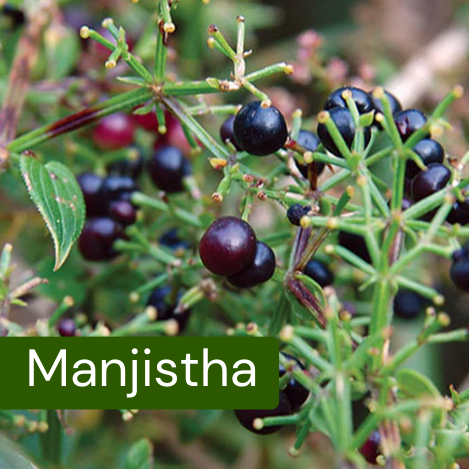Manjistha, also known by its botanical name, Rubia cordifolia, is a well-known traditional Ayurvedic herb. This herb is indigenous to the Indian subcontinent and other parts of Asia. Indian Madder and Rubia are other names for it. Manjistha has been praised for its therapeutic benefits and detoxifying properties for thousands of years. Learn more about its health benefits and remedies for overall health in this blog.
Manjistha gained a revered place in Ayurveda as it is believed to help with total detoxification of the body, cleanse and purify the blood, and remove impurities. Manjistha has been used outside of India in Chinese medicine under the name Qian Cao Gen to cure a variety of illnesses. According to Ayurvedic terminology, it is believed to have a bitter and astringent flavor and is related to the pitta dosha.
Botanical Characteristics: Manjistha is a climbing perennial herb with woody stems and bright green leaves. Its vibrant red roots, which are where the main therapeutic ingredients are found, are what set it apart from other plants. The roots are collected for their medicinal benefits and processed for use in a variety of pharmaceutical products.
Medicinal Properties: It contains a wealth of bioactive substances, each of which contributes to the variety of therapeutic characteristics it possesses. Some of its essential elements are:
- Ruberythric Acid: This substance gives Manjistha its distinctive red hue and is associated with its blood-purifying properties.
- Anthraquinones: These substances have antioxidant and anti-inflammatory properties.
- Triterpenoids: They contribute to the herb’s anti-microbial and anti-inflammatory effects.
- Xanthopurpurin Known for its anti-cancer properties.
Manjistha health benefits:
- Blood Purification: It is well known for its ability to cleanse and purify blood. It promotes the overall detoxification process by supporting the removal of toxins, metabolic waste products, and impurities from the bloodstream.
- Skin Health: It is beneficial for numerous skin issues, including acne, eczema, and psoriasis, because of its blood-purifying and anti-inflammatory properties. It can also reduce redness, itchiness, and inflammation of the skin.
- Liver Support: It promotes liver cleansing and improves liver functioning to maintain liver health. This can also help in the treatment of liver disorders.
- Anti-Inflammatory: The herb’s anti-inflammatory properties make it useful in reducing inflammation in various parts of the body, including the joints. It may help manage conditions like arthritis and gout.
- Antioxidant Protection: It’s high antioxidant content helps combat free radicals in the body, reducing oxidative stress and supporting overall health.
- Urinary Health: It can help promote urinary health by preventing urinary tract infections and enhancing kidney functioning.
- Lymphatic System Support: It has a natural affinity for the lymphatic system, which helps to enhance circulation and alleviate lymphatic congestion. This is particularly valuable for detoxification.
- Digestive Health: It promotes good digestion by balancing the digestive fire (agni) and easing digestive discomfort.
- Menstrual Health: It is often used to treat diseases like menorrhagia (heavy menstrual bleeding), menstrual abnormalities, and menstrual pain.
- Anti-Cancer Properties: Some research suggests that it may have potential anti-cancer properties, particularly in preventing and treating certain types of cancer.
How to Use Manjistha:
Manjistha can be used in several ways, depending on specific health goals and preferences. Here are some common ways to include Manjistha in your routine:
- Powder: Manjistha root powder can be used to make a beverage or paste by combining it with water, honey, or milk.
- Capsules or Tablets: Manjistha supplements are available in capsule or tablet form for convenient daily use.
- Topical Applications: Manjistha oil or paste can be applied to the skin to address various skin issues.
- Decoction: Boiling Manjistha root in water to make a decoction is another way to extract its benefits.
- Churna: Manjistha Chruna is used to reduce pitta vitiation, purify the blood, and improve the complexion.
Some of the well-known Manjistha supplements are Brihatri – Maha Manjishtadi Kashaya and Manjista Churna.
It is typically safe when used as advised, but you should always consult an experienced doctor, especially if you are pregnant, breastfeeding, or have underlying health conditions. Like any herbal remedy, it may interact with medications or produce adverse effects in some individuals.
Manjistha has a long history of use and a wide range of medical characteristics, earning it a well-deserved reputation as a healing herb. Its adaptability adds value to Ayurvedic and holistic wellness practices by strengthening the liver and lowering inflammation, as well as improving blood purification and skin health. To make sure Manjistha or other herbal medicine fits your unique needs and circumstances, consult with an Ayurvedic doctor before adopting it into your daily routine. It offers a natural approach to healing, making it a potent ally on your path to health and well-being when utilized appropriately.


